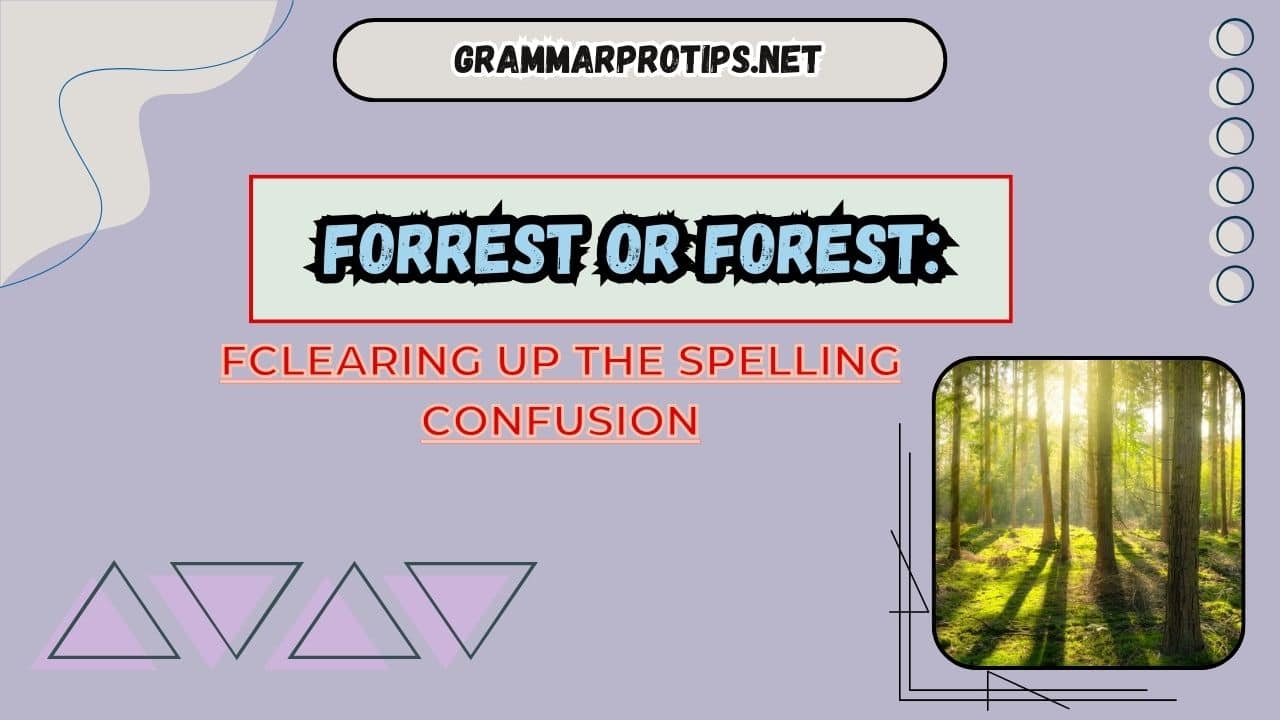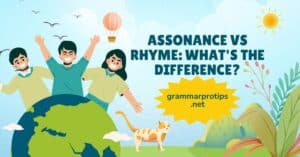At first glance, the words “Forrest” and “forest” appear almost identical. One letter, a double “r” in “Forrest” versus a single “r” in “forest”, is the only difference.
However, this small distinction can create significant confusion, especially when you are unsure whether to use one spelling or the other.
This confusion is particularly common in both casual and formal writing.
While these words may seem interchangeable at first, their meanings and uses are distinct and should be approached with care.
In this comprehensive guide, we will break down the correct usage of these words, explore their meanings, discuss real-life examples, and highlight common mistakes.
We’ll also take a deeper look into the historical roots and nuances of each word, helping you to confidently choose the correct one in your writing.
The Core Difference: Forrest vs. Forest
While “Forrest” and “forest” are close in form and pronunciation, they serve different functions in language.
Understanding their specific meanings and contexts will ensure you use them correctly. Let’s explore their uses in detail.
1. “Forest” – A Common Noun
The word “forest” refers to a large area of land covered chiefly with trees and undergrowth. It is a common noun, meaning it refers to something general rather than a specific instance.
Forests are vital parts of the natural environment, providing habitats for numerous species, contributing to biodiversity, and playing a critical role in the carbon cycle and climate regulation.
A forest can be anything from a small wooded area to an expansive woodland area stretching across hundreds of miles.
Common types of forests include tropical rainforests, temperate forests, and boreal forests.
These forests are known for their diversity of flora and fauna, and they are often described in ecological terms, such as forest ecosystems or forest habitats.
Example 1: Email about Forest Ecology
Subject: Discussion on Forest Ecology
Dear Dr. Green,
I hope this message finds you well. I’m writing to follow up on our recent conversation regarding forest ecology.
Our team has been reviewing the data from the last field study on the forest flora and wildlife in the northern forest reserve, and we’ve noted some intriguing trends in biodiversity.
It seems that certain forest fauna are beginning to emerge earlier in the season, which could suggest changes in the forest environment.
I’ve attached the report for your review and would appreciate your insights.
Sincerely,
John Pierce
In this example, forest is used to describe an area of land covered with trees and other vegetation.
The email touches on topics like forest flora, wildlife, and forest ecosystems, highlighting the importance of forests in ecological studies.
2. “Forrest” – A Proper Noun
The word “Forrest” is most often a proper noun, referring specifically to a name, whether it be a person’s first name, a surname, or occasionally, a place name.
The most famous use of “Forrest” is in the name Forrest Gump, the main character from the 1986 novel by Winston Groom and the iconic 1994 movie starring Tom Hanks.
In most cases, when you see the word “Forrest”, you are referring to an individual or specific title, not a natural environment.
It is a name with particular cultural significance, and it is typically capitalized to denote its status as a proper noun.
Example 2: Email About a Person Named Forrest
Subject: Update on Meeting with Forrest
Dear Mark,
I wanted to give you an update on my meeting with Forrest this afternoon. We discussed the upcoming marketing campaign, and he seemed very interested in pushing forward with some innovative strategies. I think we’ll have a lot to work with in terms of branding and market positioning.
Let me know if you need anything from me regarding this matter.
Best regards,
Sarah
Here, Forrest is a person’s name, making it a proper noun.
The word “forest” would be incorrect in this context, as we are referring to a specific individual rather than a natural environment.
When Do We Use “Forrest” vs. “Forest”?
Knowing when to use “Forrest” and when to use “forest” comes down to understanding their distinct purposes in writing. Here’s a simple breakdown:
Use “Forest” When:
- You are describing natural environments filled with trees, vegetation, and wildlife.
- Talking about a wooded area, a national forest, or discussing topics like forest management, forest ecosystems, or forest conservation.
- You want to convey the idea of a tree-covered region or a forest habitat where plants and animals thrive.
Example: Email on Forest Conservation
Subject: Update on Forest Conservation Efforts
Dear Mary,
I’m excited to share with you the latest developments on our forest conservation project.
The national forest we’ve been working to protect is home to several endangered species, including the northern spotted owl and the eastern cougar.
Through this initiative, we aim to safeguard the woodlands and help restore the forest flora and fauna that have been impacted by deforestation.
I look forward to your thoughts on this as we move forward.
Best,
Tom
In this case, forest is used in the context of an ecological discussion, emphasizing natural habitats and species preservation.
Use “Forrest” When:
- You are referring to a person’s name, whether it’s the first name or surname, or a fictional character like Forrest Gump.
- You are discussing titles, such as Forrester (a professional title or surname).
Example: Email About Forrest Gump
Subject: Discussing Forrest Gump for the Next Movie Night
Hi Jenny,
I wanted to bring up Forrest Gump for our movie marathon next weekend. It’s such a heartwarming film, and I think it’s a great choice for our classic movie night.
Plus, it has that timeless message of perseverance and kindness, which we could all use right now!
Looking forward to seeing you all there.
Best,
Amy
In this case, Forrest refers to the famous character Forrest Gump, and the name is used as a proper noun.
The History and Etymology of “Forrest” and “Forest”
Both Forrest and forest have deep historical roots, but their development diverged along different linguistic paths. To fully understand their distinctiveness, we must explore their etymologies.
The Etymology of “Forest”
The word forest comes from the Latin word “foris”, meaning “outside” or “outdoors.” It originally referred to any land outside of settlements or cultivated areas.
Over time, it evolved into the Old French term “forêt”, which referred specifically to a large area of trees and other vegetation, especially land that was designated for hunting.
By the late Middle Ages, the term had firmly settled into English, maintaining its association with wooded areas and wild nature.
The Etymology of “Forrest”
The name Forrest, on the other hand, has a different origin.
It is believed to be derived from the Old French “forêt”, but in this case, it refers to a surname that likely originally indicated someone who lived near or worked in a forest.
The surname has been around since the Middle Ages and is often found in English-speaking countries, though it has gained a pop culture boost due to Forrest Gump.
Common Mistakes and How to Avoid Them
Even seasoned writers sometimes confuse Forrest and forest. Here are some common mistakes to watch out for:
Mistake 1: Confusing Names and Nature
A common mistake occurs when someone uses Forrest when referring to a natural environment or ecology. If you’re discussing a wooded area, always use forest.
For instance, writing “The Forrest reserve” instead of “The forest reserve” is incorrect.
Mistake 2: Spelling Errors in Personal Names
On the other hand, some people may mistakenly use forest when referring to a person’s name.
If you’re talking about Forrest Gump or someone named Forrest, always ensure the double “r” is included.
Forrest vs. Forest: Quick Comparison
| Aspect | Forrest | Forest |
|---|---|---|
| Part of Speech | Proper Noun (name or title) | Common Noun (general term for a natural area) |
| Definition | A personal name, such as in Forrest Gump or Forrester | A large area covered with trees and vegetation, typically a habitat for wildlife |
| Use in Sentences | “I met Forrest at the conference.” | “The forest was full of tall trees and wildlife.” |
| Example Context | Refers to a specific person or title | Refers to a natural environment or habitat |
| Spelling Rule | Double “r” for names, surnames, or titles | Single “r” for general use when talking about nature or ecology |
| Common Mistakes | Using Forrest when you mean a natural environment | Using Forest when referring to a person or title |
Conclusion
Whether you’re discussing the wonders of the forest, planning a hike in a wooded area, or referring to the inspiring journey of Forrest Gump, understanding the difference between Forrest and forest is key to clear, precise communication.
By following the guidelines outlined here, you can confidently navigate the tricky terrain of spelling and ensure that you use the correct term for any given context.
From its role in environmental science to its place in pop culture, forest and Forrest each hold their own unique significance.
Now that you have the tools to differentiate them, you can avoid the confusion that often arises and ensure your writing is as accurate as it is engaging.
Read more knowledgeable blogs on Grammar Pro Tips

Sienna Mauldon is a passionate writer and grammar expert. On her blog, she shares easy-to-follow guides to help readers master grammar rules and improve their writing. With a love for language and teaching, Sienna makes grammar simple and fun for everyone, from beginners to experienced writers.








